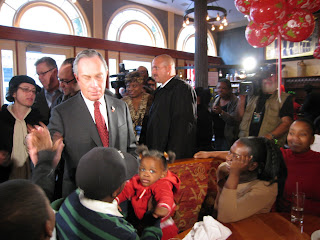THE latest all-American hero is a 71-year-old grandfather of four. Well, at least to some Republicans out there.
It was a chilly 2°C on Tuesday evening when the white-haired Arizona senator John McCain turned up at St Regis Hotel in Manhattan for a private fund-raising event.
Despite the cold, about a dozen people stood outside the hotel, carrying placards that demonstrated their admiration for the presidential candidate of their choice.
“John, we love you”; “McCain, an American Hero”; “Keep America strong, Vote for McCain” and “New York loves Mac” were some of the declarations that evening.
It is McCain’s turn to be in the spotlight now, ever since he captured New Hampshire and South Carolina in the past three weeks. (The Republican Party has held selection rounds in six states so far.)
The man was nearly written off last year when his campaign failed to raise enough funds to keep the ball rolling. Apparently, some of his closest aides are even working without pay.
But, now, it is a different story. McCain is emerging as the most winnable Republican candidate in the war with the Democrat Party, which has a line-up of heavy-weight contenders in the likes of Hillary Clinton and Barack Obama.
“The Democratic presidential debate last night mentioned my name a few times. It is clear that they view me as a formidable opponent. I totally agree with them,” he said, referring to Monday’s debate on CNN.
He joked with the press, saying that he had never believed in the polls “until now, when the numbers start to look better for me. It’s funny how your attitude changes.”
There was barely elbow room at the St Regis Library Room where the press conference took place. His aides were delighted with the press turnout; one of them took pictures of the photographers sitting on the floor waiting for their boss.
Former senator Alfonse M. D’Amato described McCain as a true national treasure and hero.
“This is a man whose time is here. He is the strongest Republican candidate. John McCain’s the man (to capture the White House),” he said.
To him, McCain was a man who “walks the talk” and who had supported a surge of 30,000 US troops in Iraq, which according to reports, had led to some measure of success there since.
Prior to this, his stance on Iraq had signalled his political demise, as Americans remained deeply unhappy about the war.
McCain’s youngest son is a 19-year-old marine serving in Iraq. The man himself was a prisoner of war in Vietnam for five years. According to his website, his aircraft was hit in October 1967 and he was subsequently held at the infamous “Hanoi Hilton”.
Much has been made about his age (he would be the oldest first-term president ever if he wins) but this former fighter pilot is a picture of health.
His mother is 95 years old, by the way.
McCain’s short address to the press that day was a summary of what he has been saying throughout his campaign; that he has the experience and knowledge to deal with Islamic extremism; he wants to lower taxes, unlike the Democrats who would do the opposite; and he wants to end Washington’s spending spree.
“We need to return to the Reagan years,” he said.
He also emphasised his plans for people who have lost their jobs, and his focus on job retraining.
W.H., a political writer, said Americans liked McCain because he was a candidate who appealed to a broad range of voters.
“In this case, Mike Huckabee (another Republican contender) is not a good choice; Americans are religious, but they are not religious nuts,” he said of the former Baptist pastor who won the Jan 3 Iowa caucuses based on support from working-class evangelical Christians.
“Huckabee is a bit too crazy with his stand on anti-evolution, anti-gay, etc. Moderates don’t like this kind of candidate. He is too much of a social conservative for American fence sitters.”
Another rival, Rudy Giuliani, is facing criticism over his personal life. He is most infamous for dumping his second wife at a press conference in 2000, a move that the woman had no prior knowledge of.
The thrice-married former New York mayor has lost in all the six nominating contests so far.
As for Mitt Romney, W.H. said he had not come clean about his Mormon faith. “He is also a millionaire businessman; many Americans do not feel that he is ‘one of us’,” he said.
“So, it looks like McCain is the most electable Republican presidential candidate. Why? Because he’s a moderate liberal, and Americans like that,” W.H. said.
Tuesday is the next big date for the Republicans when the nomination contest takes place in Florida.
Will it be Big Mac again? New York magazine reported him as a superstitious man who kept his lucky penny and compass on him during the New Hampshire contest.
“I found a nickel on the ground with its head up and I kept it,” McCain was recently quoted as saying. “With the head up, not the tail up.”




